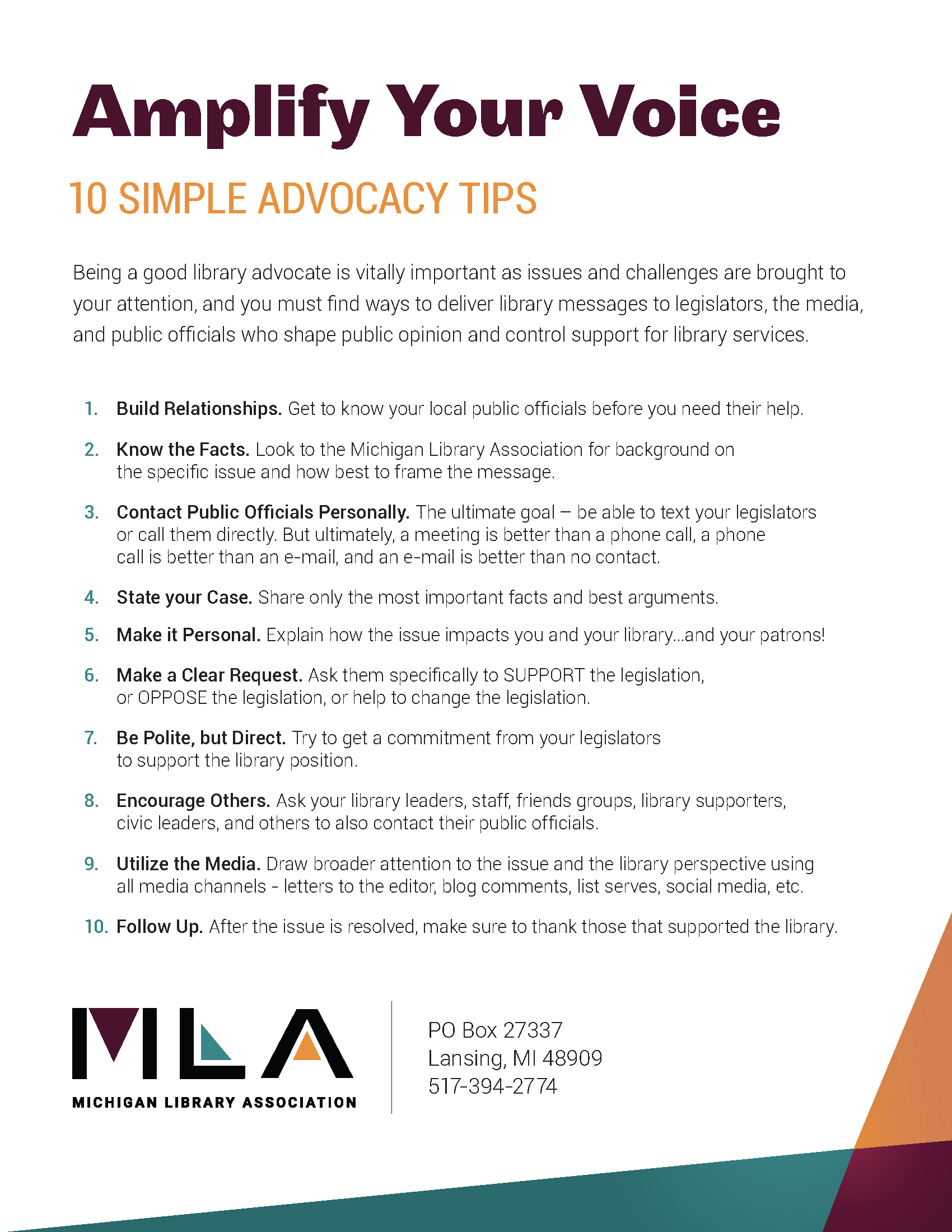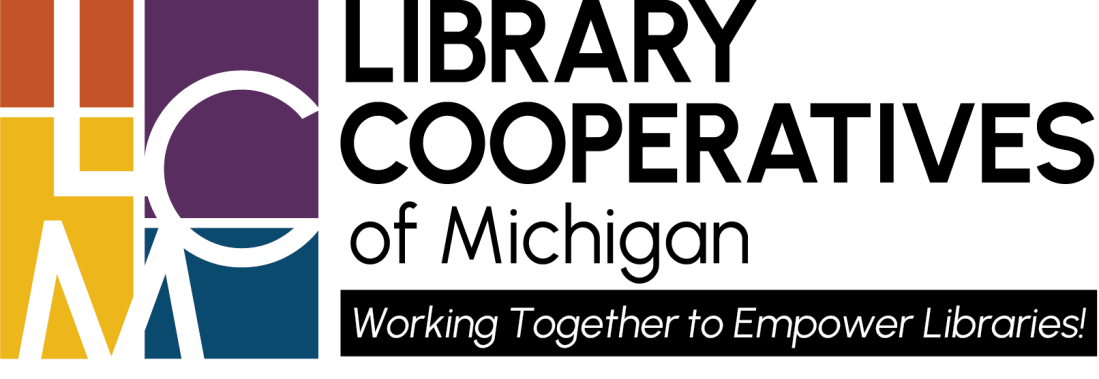- About
- Membership
- Education & Events
- Event Calendar
- Annual Conference
- Spring Institute for Youth Services
- Think Space
- Surviving and Thriving as a Public Library Director
- Leadership Academy
- Michigan Library Advocacy Day
- Advocacy Hour
- MLA Connect
- MLA Connect On Demand
- Call for Proposals
- Vendor and Sponsor Opportunities
- Future Event Dates and Locations
- Programs & Services
- Advocacy
- News
- Job Board

MLA Advocacy Action Plan | Priority Areas | Bill Tracker | Call To Action | Find Your Legislators | How to be a Good Advocate | Intellectual Freedom resources | Advocacy News How to Be a Good AdvocateWhat is advocacy? Who are library advocates? How can you be a good advocate? The Michigan Library Association defines advocacy as a wide range of activities conducted to influence decision-makers at the local, state and national levels. This definition intentionally includes not only traditional advocacy work like lobbying and public education, but also capacity building, relationship building, communication, and leadership development. Through this toolkit, we hope to engage you as you set forth to increase public awareness of the importance, value and relevance of libraries and library services here in Michigan. Being a good library advocate is vitally important as issues and challenges are brought to your attention, and we must find ways to deliver library messages to legislators, the media, and public officials who shape public opinion and control support for library services. Our world is changing before our eyes, and we have to amplify our voices to increase funding, campaign for millages and new buildings, or deal with controversial issues that come through our social media feeds. Library advocates are librarians and library staff, library trustees, friends of libraries, library users/stakeholders/supporters, community and organizational leaders, library and information science students and so many others. Library advocates have clout, and you should reach out to them, let their voices be heard and engage them in your messaging. So now, how can you be a good library advocate… Build RelationshipsBeing a good library advocate means that you must first build good relationships. Don’t wait until issues and challenges arise before getting to know your state and federal legislators; your mayor, city council members, and city manager; township and county officials; local media; police chief and fire marshal; local health department officials; chamber of commerce staff; school board members; and so many others. Call their offices and introduce yourself and invite them to hold coffee hours or office hours at your library. Provide a “backstage” tour of your facilities and introduce them to your staff. Invite local dignitaries to read aloud during March is Reading Month. Add them to your newsletter distribution lists and make sure they are receiving invitations for any programs you are holding. Make sure that they are invited to speak at your building openings. Make sure when you call that they will answer. Get their cell phone numbers. Make sure you know how to reach them when you need them at your side. Know the FactsStay informed about the issues, both locally and nationally. Join the Michigan Library Association and other statewide and national advocacy networks. Participate in statewide and national advocacy day events to learn about issues that are relevant to libraries. Define the role of local, state and federal dollars in relation to your local library activities and be prepared with the facts. Appeal to reason; an emotional appeal is not enough. Back your arguments with facts and substance. Know the SystemFind out who your elected officials are at the local, county, state and federal levels. Get to know decision-makers and be sure they are familiar with your activities. Find out which organizations, government units and agencies set policies that could affect libraries and cultural development. Learn how each works, how policies and decisions are made and who or what influences decision-makers. Getting to the right people with facts and information about who will be affected, how they will be affected, and who cares, can influence opinions, attitudes, decisions and votes. Create a log of contact and background information of elected officials and track your correspondence history so you can document your progress. Be sure your state and national legislative representatives regularly receive information from you or your library – and get on their mailing lists, too. Provide elected officials with opportunities at your public events. Invite public officials to talk to your board, staff and volunteers about the importance of your library to the community. Design Your CampaignPut together a plan of action with priorities, strategies and timelines. Consider these factors when building your plan: Is this issue critical to my library/community? When will the issue be discussed/decided and by whom? Is there time to call or write to my supporters and constituents? To launch a letter-writing campaign? To meet directly with the decision-makers? Who are the decision-makers you want to reach? Who should contact those decision-makers and how? State Your CaseYour key messages are a critical part of the way you build understanding and motivate people to respond. Be clear and concise. Provide alternatives. Don’t just point to the problem; offer solutions. Shape your key messages in the very early stages of preparing your advocacy plan. Know your target audiences and the vehicles that will help get your message to them. Clearly state the action you endorse and ask decision-makers for their support. Show how proposed policy or legislation would affect the community and/or your library. Telling the right stories and backing them up with statistics will increase the impact of your case and establish credibility. “No story without numbers, no numbers without a story.” Keep your message focused on positive results and mutual benefits. For instance, use local statistics to show how the library successfully educates children, attracts tourists, stimulates business and generates local and regional partnerships – all of which benefit the entire community. Anticipate Questions and OppositionResearch who opposes your position, why, and what they are saying about the issue. Assume that opponents will also contact decision-makers and their staff. Assume that you will get requests to explain your facts. Be prepared for questions driven by a different position or perspective on the issue. You and your supporters should identify these potential questions and how you will address them. Encourage Others to AdvocateFind others in your community to join you in delivering your message. A business owner makes a meaningful case about economic development and community partnerships. A school principal brings additional credibility to your case in the schools. Request action from your supporters but make sure the expectations of your advocates are clear and specific. Provide your library’s key messages, talking points and contact information for individuals and organizations your supporters should contact if necessary. Make it easy for people to contribute their time and energy. Make advocacy part of everyone’s job description, including library trustees, staff and volunteers. Continually monitor the policies and decisions that could affect you and communicate your interests. Keep in regular communication with your advocates so they feel connected with your cause and ready to act on your behalf. Establish communication with other organizations and coalitions that are working on related issues or toward compatible goals. Create an advocacy e-mail list or phone tree, so you can mobilize quickly as issues come up. Share Your Success StoriesAllow those who are compelled to share their stories with you to be active in helping to promote your library and advocate for issues that affect you. Most libraries keep testimonials from constituents on file for various purposes, and those who have been positively affected by an experience often want to share their stories. These success stories not only serve as positive reinforcement for the libraries that have offered a service but can also serve as powerful tools in gaining support for causes and promoting your library. Post these success stories on your website and social media networks. Share them with your elected officials so they can see the impact your library has made in the community. Utilize the MediaThough posting on social media may be relatively easy and fast. the organization's "voice" should always be considered. Libraries are responsible for the content under its editorial control, and even indirect actions ("liking" the photo of an external organization or person, sharing or retweeting external content. responding to comments. etc.) factor in this. Messages that are polarizing in nature can harm the organization's ability to facilitate dialogue. To effectively advocate through social media, it can help to establish ahead of time what the tone of the organization will be going forward and to maintain it consistently. Writing to your local newspaper can also be an effective way to draw attention to a local issue. Letters to the editor are shown to be among the most-read sections of a newspaper. and are often read by government officials to get a "pulse" on public sentiment in an area. Although relatively small, these letters can make a big impact, especially when paired with good storytelling. Including your personal experiences. interests. and ideas can help personalize the letter. Track Issues, Get Feedback, and Follow UpLibraries can designate board members as liaisons to key commissions and agencies. Monitoring such things as the budget development process or the availability of an underutilized funding source is important in preparing you and your library to act immediately and effectively. Ask advocates to report back immediately after they’ve made contact with officials. Ask them to report conversations with decision-makers, especially if they indicate a concern or position held by the decision-maker. Thank your elected officials as often as possible. If you don’t have time to write, make a call. Never let them forget you are out there and that their support is not only appreciated but crucial. Report to advocates on the results of their efforts. Keep them positively and actively engaged by showing them that they are making a difference. Act Regularly and PromptlyDon’t wait for someone else to take charge. Make a commitment to do what you are able to do, no matter how small it may seem. Advocacy and Lobbying ResourcesAmerican Library Association http://www.ala.org/aboutala/sites/ala.org.aboutala/files/content/ola/2008lah.pdf The Independent Sector http://www.independentsector.org/advocacy#sthash.NgYbTHj8.dpbs |









